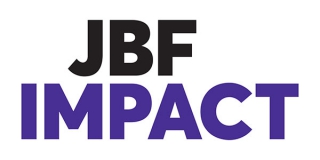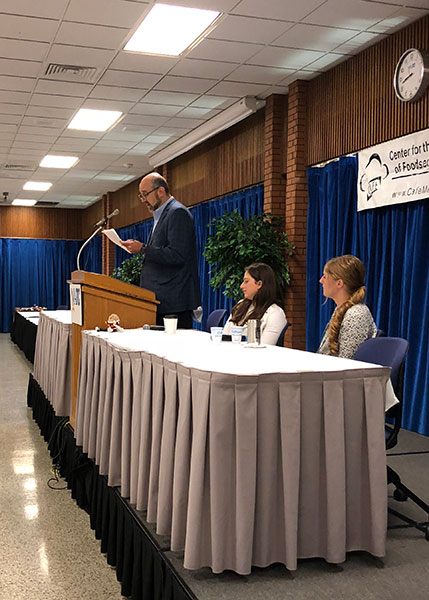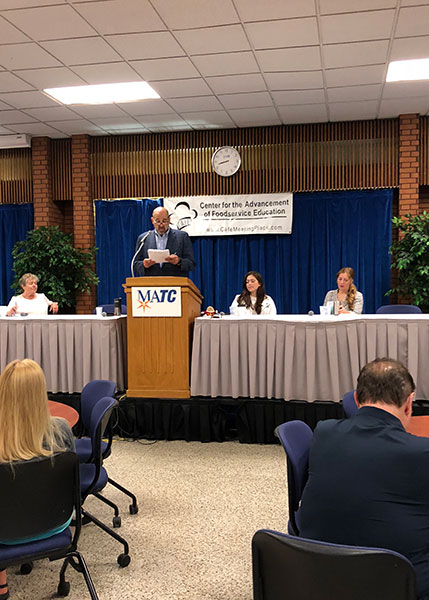
Culinary Instructors Invited to Join Free Food Waste Prevention Training
14 August 2018JBF Impact Program looks to halt food waste by initiating an industry-wide change beginning with culinary instructors.
By Lisa Parrish, GMC Editor
Food costs money and wasting food is like throwing money into a dumpster. According to ReFED’s research, the restaurant industry annually squanders more than 20 million tons of food, which totals more than $70 million tossed out with the garbage. And, this doesn’t address the social and environmental impacts of the discarded foodstuff.
Culinary instructors have an opportunity to change the wasted food landscape. The James Beard Foundation (JBF), with support from The Rockefeller Foundation, will roll out a national food waste prevention program, Creating a Full Use-Kitchen, in September. Attendees of CAFÉ’s Leadership Conference in June had the opportunity to preview two of the modules and the response was overwhelmingly positive, according to Mary Petersen, CAFÉ President.
“Educators participated in a hands-on class focusing on the curriculum’s food waste reduction and repurposing methods,” said Petersen. “They also attended a forum where JBF representatives discussed practical ways culinary instructors could reduce waste and streamline purchasing across the culinary program. All the comments were supportive and enthusiastic.”
 Dr. Jonathan Deutsch, JBF Impact Fellow and professor of culinary arts and food science and founder of Drexel University’s Food Lab, said. “Attendees already got a jump-start by completing two of the course’s hands-on culinary labs and one of the didactic pieces. This was the perfect place to get the program started.”
Dr. Jonathan Deutsch, JBF Impact Fellow and professor of culinary arts and food science and founder of Drexel University’s Food Lab, said. “Attendees already got a jump-start by completing two of the course’s hands-on culinary labs and one of the didactic pieces. This was the perfect place to get the program started.”
The online JBF Impact Program, Creating a Full-Use Kitchen, is served up by Morton’s Salt® and LeanPath. It’s designed to introduce food waste reduction methods into the culinary school classroom. The content is intended to complement existing curriculum by providing information on the history of food waste and creative approaches for combatting it. Creating a Full-Use Kitchen provides technical and creative approaches to food waste and examines the need to reduce food loss along the entire supply chain.
The web-based curriculum is appropriate for instructors working across a wide range of institutions—from technical schools to community colleges to four-year universities. It offers skills training and the curricular tools needed to inspire current and future generations of culinary students to minimize waste, maximize the use of ingredients, and instill a value and respect for food resources. With the train-the-trainer model, Creating a Full-Use Kitchen aims to arm culinary school instructors with the tools needed to educate the next generation of chefs and culinary professionals on food waste reduction.

“We don’t think it’s realistic for instructors to roll out a full course on food waste prevention - though some have mentioned they will - but rather the hope is that instructors will use the resources on the course site as it makes sense for them,” Dr. Deutsch said. “For example, when educators teach food safety and sanitation, it would be a great opportunity to talk about the nuances of the regulations for best by/sell by/use by and also the legalities and liability of food donation. Another example might be if an instructor is teaching knife skills, it’s a great opportunity to talk about what is being left on the cutting board and how that might be used for financial, environmental and social benefit.”
The program has been shaped and tested throughout the year by a Culinary Instructor Pilot Group as well as the Our Food Waste Curriculum Advisory Committee.
Interested instructors are invited to participate in the program. “Over the next month, we are moving from pilot phase to full roll out. Our goal is to reach 500 instructors! The program is completely free thanks to generous support from the Rockefeller Foundation and Morton’s Salt,” said Dr. Deutsch.
Click here to join the program: Fullusekitchen.rouxbe.com.
According to Dr. Deutsch, instructors who are familiar with CAFÉ and attend its conferences are a valuable potential audience for the food waste reduction program. “CAFÉ attracts instructors who invest in themselves and take their own professional development seriously. They want to bring great ideas to their classes. This is the perfect place to get this program rolling,” he said.
